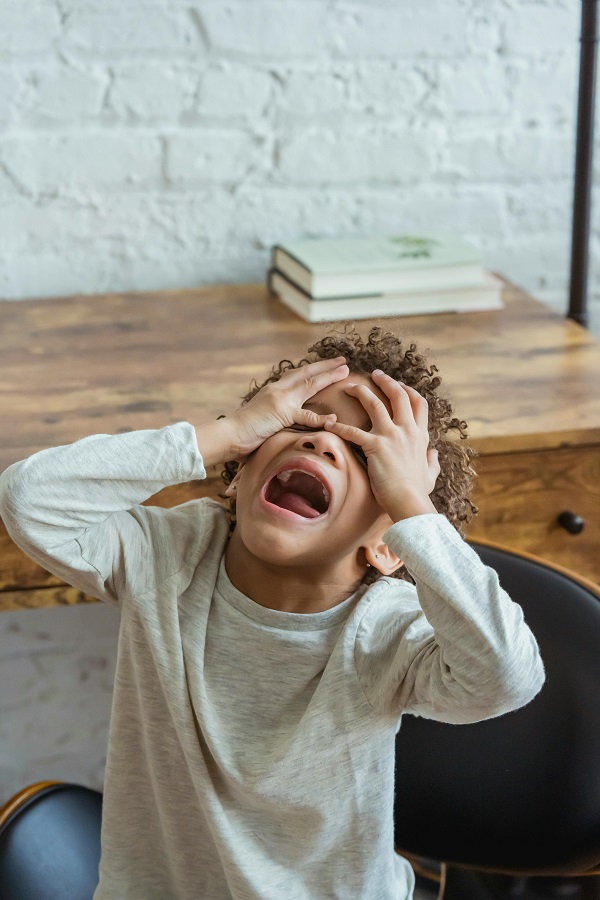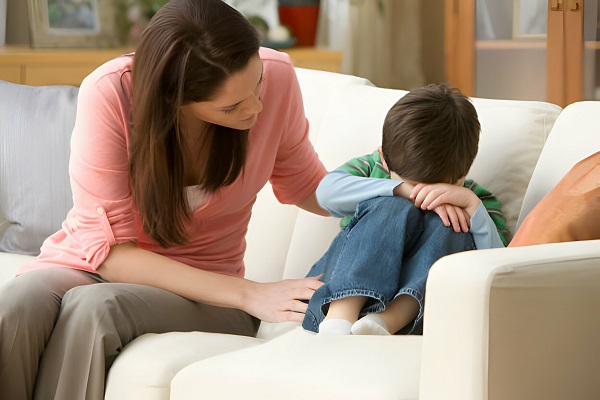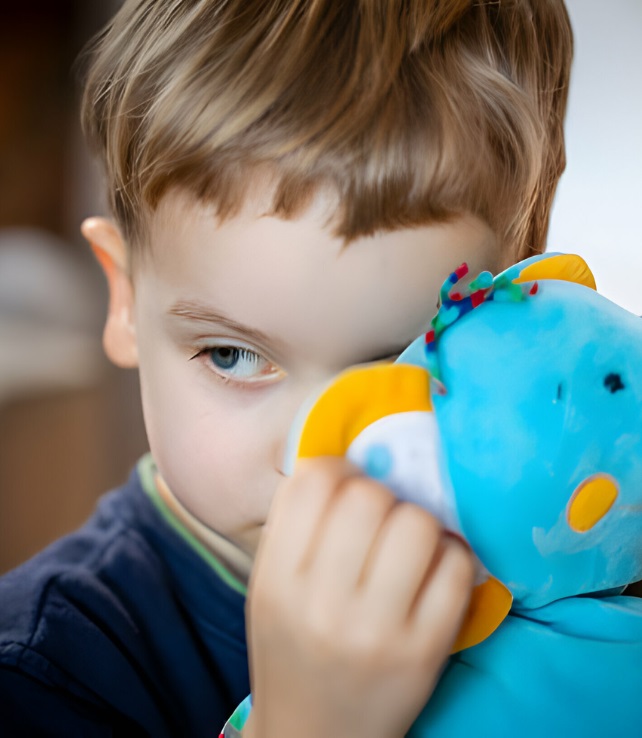Last Updated on January 2, 2025 by Emma
Childhood anxiety can cause symptoms like excessive worrying, fear, and physical complaints. It can be managed through therapy, lifestyle changes, and support from family and professionals.
Childhood anxiety is a common mental health issue that can have a significant impact on a child’s well-being and development. Parents and caregivers need to recognize the symptoms of childhood anxiety and understand the available solutions to provide effective support.
By gaining insight into the signs of anxiety and learning about potential interventions, individuals can better navigate the challenges associated with childhood anxiety. This article aims to explore the symptoms of childhood anxiety and provide practical solutions for managing and alleviating its effects on children’s lives.

Discover More – Annie’s Recipes Sweet Amish Pickles: Know the Secret!
What Is Childhood Anxiety
Childhood anxiety is a condition characterized by excessive worry, fear, and nervousness in children. It can manifest through physical symptoms like stomachaches and headaches. Understanding the symptoms and implementing appropriate solutions can help children cope with and manage their anxiety effectively.
Childhood anxiety is a common mental health issue that can affect children of all ages. It involves feelings of fear, worry, and nervousness that can interfere with daily activities and social interactions.
Children with anxiety may experience physical symptoms such as headaches, stomachaches, or rapid heart rate. Parents and caregivers need to recognize the signs and provide appropriate support.
Common Signs And Symptoms Of Childhood Anxiety
- Excessive worrying about everyday activities
- Frequent complaints of physical ailments
- Avoidance of social situations or school activities
Other signs may include irritability, difficulty concentrating, and sleep disturbances. Early identification and intervention are key to managing childhood anxiety effectively.
Causes Of Childhood Anxiety
Childhood anxiety can stem from various causes. Understanding these causes is crucial in identifying and addressing anxiety in children effectively.
Genetic Factors
Genetic factors play a role in childhood anxiety disorders, with a strong familial component.
Environmental Factors
Environmental factors such as traumatic events or high levels of stress at home or school can trigger anxiety in children.
Discover More – Healthy Eating for Kids: Tips for Encouraging a Balanced Diet
Effects Of Childhood Anxiety
Childhood anxiety can manifest in various symptoms including excessive worry and physical complaints. Understanding these signs early on is crucial for implementing effective solutions such as therapy and relaxation techniques to support children’s mental well-being.
Effects of Childhood Anxiety
Childhood anxiety can have significant effects on various aspects of a child’s life. It can impact their academic performance and social relationships, causing them to struggle with everyday activities. Understanding these effects is crucial to providing the necessary support and intervention for children experiencing anxiety.
Impact on Academic Performance
Anxiety can have a profound impact on a child’s ability to concentrate and learn. They may experience difficulties in staying focused, resulting in decreased productivity and academic achievement. Anxiety can also affect their memory and problem-solving skills, making it harder for them to absorb and retain information. As a result, their overall academic performance may suffer.
Here are some ways in which childhood anxiety can impact academic performance:
- Trouble staying focused in class
- Difficulty completing assignments on time
- Poor performance on tests and exams
- Avoidance of school-related activities, such as presentations or group projects
- Increased absenteeism due to physical symptoms related to anxiety
Impact on Social Relationships
Childhood anxiety can also greatly affect a child’s social interactions and relationships with peers. It can make them feel self-conscious, overly worried about being judged, or constantly fearful of making mistakes. These anxieties can lead to the following challenges with social relationships:
- Difficulty initiating or sustaining conversations
- Avoidance of social situations or activities that involve interaction with others
- Feelings of isolation or being left out by peers
- Struggles with forming and maintaining friendships
- Inhibited participation in group activities or teamwork
It is important to understand that childhood anxiety impacts not only the child’s academics but also their social well-being. Recognizing these effects can help parents, teachers, and caregivers provide the necessary support and create an environment that promotes the child’s overall well-being.
Treating Childhood Anxiety
Childhood anxiety can be effectively treated through various therapy and medication options aimed at helping children manage their symptoms and improve their overall well-being.
Therapy Options
Therapy is a crucial component in treating childhood anxiety. Cognitive-behavioral therapy (CBT) is one of the most effective methods for children with anxiety. It helps kids recognize and change anxious thoughts and behaviors, enabling them to develop coping skills. Exposure therapy is another form of treatment that slowly introduces children to feared situations or objects in a safe and controlled manner, reducing their anxiety over time.
Medication Options
Medication may be considered for children with severe anxiety that significantly impacts their daily lives. Selective serotonin reuptake inhibitors (SSRIs) are commonly prescribed for pediatric anxiety. These medications work by increasing serotonin levels in the brain, helping to alleviate anxiety symptoms. However, it’s essential to closely monitor children on medication for any potential side effects and to ensure they’re used in conjunction with therapy for the best results.

Discover More – ACL Recipes Peru: A Culinary Journey Through the Heart of the Andes
Prevention And Coping Strategies
Discover effective strategies to prevent and manage childhood anxiety. Learn about symptoms and practical solutions for supporting young ones in navigating anxiety challenges successfully. Engage in proactive approaches to help kids develop resilience and coping skills for healthier emotional well-being.
According to the American Academy of Child and Adolescent Psychiatry, childhood anxiety can be effectively managed through prevention and coping strategies. Teaching relaxation techniques, promoting healthy habits and providing a supportive environment can significantly reduce the impact of anxiety on children. Implementing these strategies can help children handle stress and anxiety more effectively, leading to improved overall mental well-being.
Teaching Relaxation Techniques
Teaching children relaxation techniques can equip them with valuable tools to manage their anxiety. These techniques, such as deep breathing exercises, meditation, and progressive muscle relaxation, can help children calm their minds and bodies when they feel overwhelmed. By regularly practicing these techniques, children can develop a sense of control over their emotions and reduce the intensity of their anxiety.
Promoting Healthy Habits
Incorporating healthy habits into a child’s daily routine can play a crucial role in preventing and managing anxiety. Encouraging regular exercise, a balanced diet, and sufficient sleep can help reduce stress and anxiety levels in children. Physical activity releases endorphins, which are natural mood lifters, while a nutritious diet and adequate rest contribute to overall emotional well-being. Ensuring these healthy habits are a part of a child’s lifestyle can have a positive impact on their mental health.
Remember
These prevention and coping strategies can empower children to navigate challenging situations with confidence and resilience. By promoting these strategies, parents and caregivers can help create a supportive environment that fosters emotional well-being in children.
Frequently Asked Questions
What Are The Common Symptoms Of Childhood Anxiety?
Children may show restlessness, excessive worry, irritability, and difficulty concentrating as common symptoms of anxiety. It’s crucial to notice changes in behavior and pay attention to physical symptoms like headaches or stomach aches.
How Can Parents Identify If Their Child Is Dealing With Anxiety?
Parents should look for changes in behavior, such as avoidance of social situations or excessive worry. Physical symptoms like trouble sleeping or frequent stomach aches may also indicate anxiety.
What Strategies Can Parents Use To Help Their Anxious Child?
Parents can support their children by creating a calm and predictable routine, teaching coping skills, and encouraging open communication. Seeking professional help from a therapist or counselor is vital for effective management.
Can Childhood Anxiety Have Long-term Effects On A Child?
Yes, untreated childhood anxiety can lead to long-term effects such as low self-esteem, poor academic performance, and difficulty forming interpersonal relationships.
When Should Parents Seek Professional Help For Their Child’s Anxiety?
Parents must seek professional help if their child’s anxiety negatively impacts their daily life, relationships, or school performance. An early intervention can prevent long-term struggles with anxiety.
Conclusion
Parents and caregivers must recognize and understand the signs of childhood anxiety. By being aware of common symptoms like restlessness, excessive worry, and physical complaints, they can provide the necessary support and seek appropriate help.
With a combination of therapy, mindfulness practices, and lifestyle adjustments, children can develop effective coping mechanisms and overcome anxiety. Remember, early intervention is key in ensuring a brighter future for our little ones. Let’s work together to create a nurturing environment where they can thrive.

